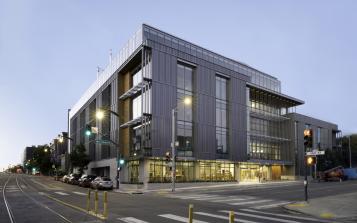By Nicholas Roznovsky

The UCSF Adult Psychiatry Residency Training Program will welcome 16 new resident physicians this summer, comprising the largest cohort of first-year psychiatric residents in California.
After receiving more than 970 applications and conducting interviews with 104 candidates, the UCSF Adult Psychiatry Residency Training Program (RTP) announced that it will welcome a full class of 16 new resident physicians into its Class of 2026. The incoming class, which will begin clinical work in late June following orientation activities, is a diverse and highly accomplished group.
Together, the cohort has published more than 198 peer-reviewed manuscripts, including 124 with first-authored publications. They hold interest in a wide variety of sub-specialties, including addiction psychiatry, basic science research, child and adolescent psychiatry, consultation-liaison psychiatry, geriatric psychiatry, global mental health, health services research, interventional psychiatry, mental health policy, and public psychiatry.

The incoming RTP Class of 2026 will be among the first group of residents to receive educational instruction in the new UCSF Nancy Friend Pritzker Psychiatry Building.
The incoming class contains presidents of student interest groups in psychiatry, Student National Medical Association and Latino Medical Student Association officers, Alpha Omega Alpha Honor Medical Society and Gold Humanism Honor Society members, editors-in-chiefs for literary magazines, Peace Corps volunteers, managers of free clinics, members of medical student curriculum committees, founders of non-profit community organizations, recipients of T32, and presidents of LGBTQ organizations. Included in the group are fluent speakers of Arabic, French, German, Hebrew, Hungarian, Kru, Ibo, Italian, Mandarin, Persian, Spanish, and Yoruba.
Additional facts about the UCSF Adult Psychiatry Residency Training Program Class of 2026:
- 69 percent are women
- 56 percent are from under-represented minorities in medicine (as defined by the Association of American Medical Colleges)
- 44 percent hold combined MD/PhD or MD/MPH degrees and several others have additional master's degrees
- 31 percent received their medical degree from California institutions, 69 percent from medical schools in other U.S. states
- 19 percent intend to participate in the UCSF Psychiatry Research Resident Training Program
- At 16 students, this year's incoming class of psychiatry residents is the largest in California and among the largest in the nation
"Each member of the Class of 2026 makes me excited to be an educator at this critical time, in not only psychiatry residency education, but also in a post-pandemic world that faces several critical issues in health disparities," said RTP director Erick Hung, MD. "I am inspired to see the diversity, leadership, innovation, and compassion this new class will bring to UCSF and to our field."
According to preliminary figures provided by the National Resident Matching Program, more than 47,000 U.S. and international medical school students and graduates vied for over 39,000 residency positions across all specialties, making this year's match one of the largest in history. Of those, 2,106 applicants were offered residency positions by 382 psychiatry and psychiatry-related programs. Since 2018, the total number of first-year psychiatry residency positions offered nationwide has increased by 35.3 percent.
About UCSF Psychiatry and Behavioral Sciences
The UCSF Department of Psychiatry and Behavioral Sciences and the Langley Porter Psychiatric Institute are among the nation's foremost resources in the fields of child, adolescent, adult, and geriatric mental health. Together they constitute one of the largest departments in the UCSF School of Medicine and the UCSF Weill Institute for Neurosciences, with a mission focused on research (basic, translational, clinical), teaching, patient care, and public service.
UCSF Psychiatry and Behavioral Sciences conducts its clinical, educational, and research efforts at a variety of locations in Northern California, including Langley Porter Psychiatric Hospital; UCSF Medical Centers at Parnassus Heights, Mission Bay, and Mount Zion; UCSF Benioff Children’s Hospitals in San Francisco and Oakland; Zuckerberg San Francisco General Hospital and Trauma Center; the San Francisco VA Health Care System; UCSF Fresno; and numerous community-based sites around the San Francisco Bay Area.
About the UCSF Weill Institute for Neurosciences
The UCSF Weill Institute for Neurosciences, established by the extraordinary generosity of Joan and Sanford I. "Sandy" Weill, brings together world-class researchers with top-ranked physicians to solve some of the most complex challenges in the human brain.
The UCSF Weill Institute leverages UCSF’s unrivaled bench-to-bedside excellence in the neurosciences. It unites three UCSF departments—Psychiatry and Behavioral Sciences, Neurology, and Neurological Surgery—that are highly esteemed for both patient care and research, as well as the Neuroscience Graduate Program, a cross-disciplinary alliance of nearly 100 UCSF faculty members from 15 basic-science departments, as well as the UCSF Institute for Neurodegenerative Diseases, a multidisciplinary research center focused on finding effective treatments for Alzheimer’s disease, frontotemporal dementia, Parkinson’s disease, and other neurodegenerative disorders.
About UCSF
The University of California, San Francisco (UCSF) is exclusively focused on the health sciences and is dedicated to promoting health worldwide through advanced biomedical research, graduate-level education in the life sciences and health professions, and excellence in patient care. UCSF Health, which serves as UCSF’s primary academic medical center, includes top-ranked specialty hospitals and other clinical programs, and has affiliations throughout the Bay Area.





